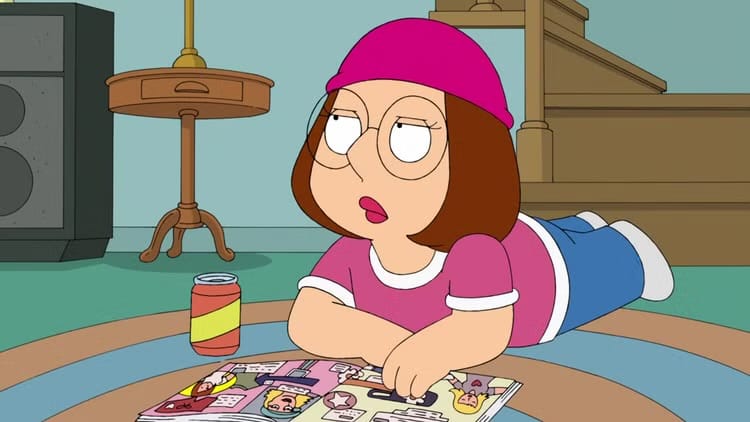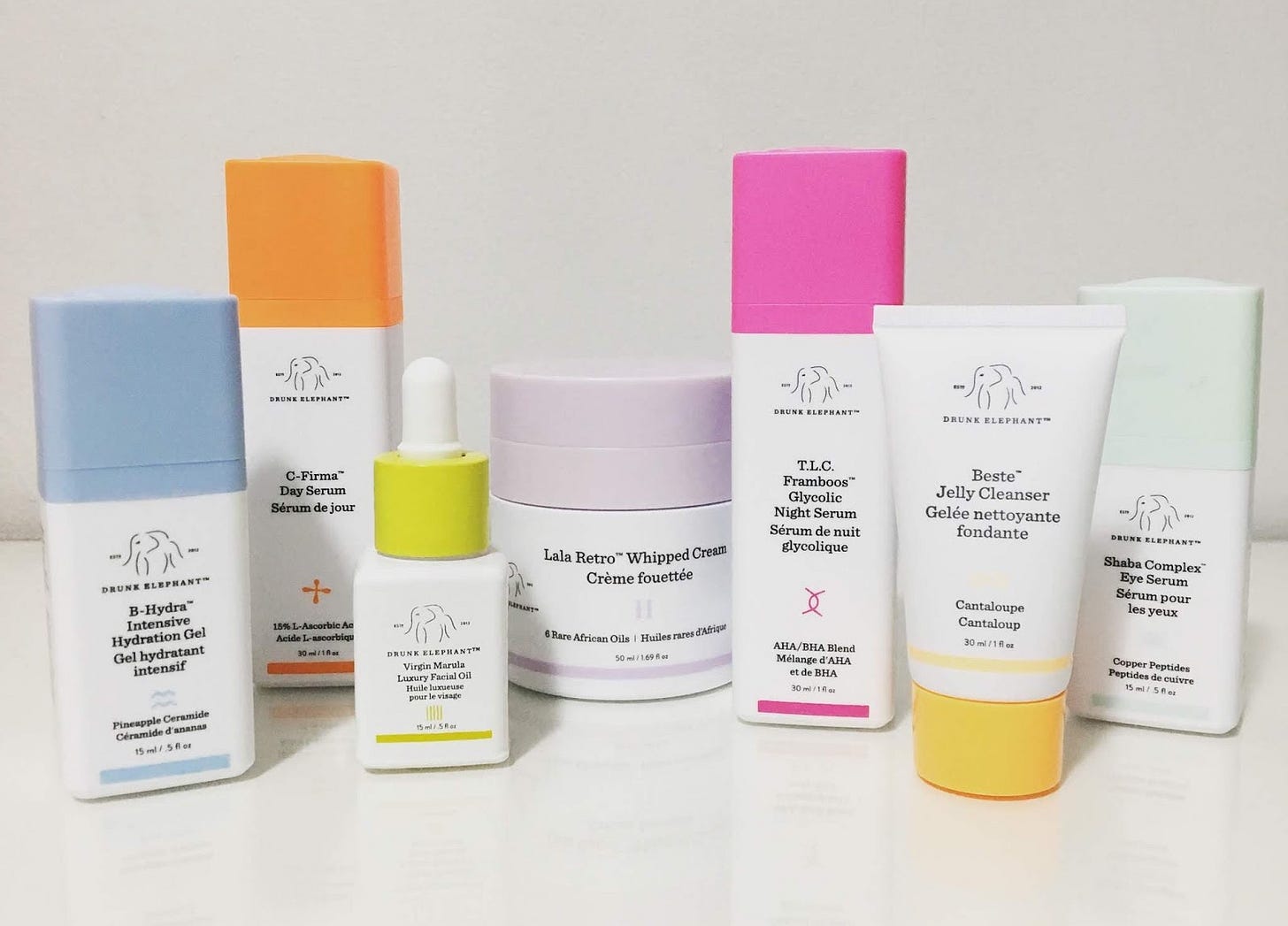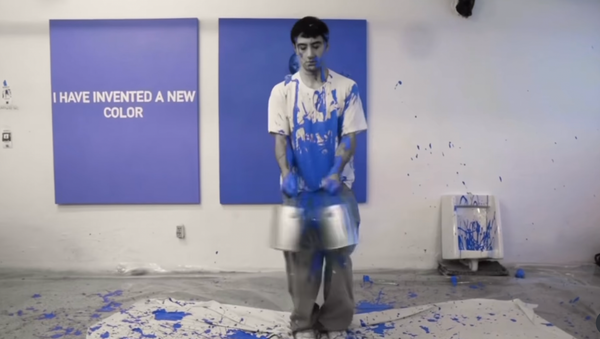Being Beautiful is Too Much Work: Meg Knows It, and So Do Thousands of Teens
Whether it’s the town of Quahog or the very real world of beauty marketing, schools, and social media, young teenagers like Meg are frequently pressured by their surroundings into feeling not enough.

“Hi Meg. I can’t fit all my books in my locker. Could I put the rest of them on your ginormous ass?”
Says Connie D’Amico in the episode “Peter’s Daughter.” This beautiful mean girl finds joy in ceaselessly bullying Meg Griffin, the unprepossessing daughter from the Griffin family. Across twenty-two seasons of Family Guy, this is merely a small portion of the dark moments when Meg undergoes bullying and humiliation because of her unflattering body and appearance.
Over twenty-four years of Family Guy’s releasing, Meg has always been tagged as “ugly” and “unattractive.” Her character design, which features traits like a pink beanie hat, huge glasses, short arms and legs, a rounded face, and a muffin top-like body, emphasizes her unremarkable appearance and horrible fashion taste. Moreover, Meg’s body possesses an incredibly fatal power of ugliness. In the episode “The Griffin Family History,” robbers who break into her family’s house refuse to have sex with her when she begs them to and accuse her of sexual harassment, while in the episode “A Fistful of Meg,” she kills her bully Michael by simply lifting her clothes and revealing her naked body. Meg knows people in Family Guy hates her image. As a result, she struggles with self-doubt, blaming her body image for preventing her from being loved.
For years, fan communities have criticized Family Guy for its mockery of Meg’s image. On social media and forums like Reddit, many complain that the production team treats Meg poorly by relentlessly humiliating her appearance despite she looks totally fine and has done nothing bad. As a fan of Family Guy, I’ve always found Meg to be one of the sitcom’s most relatable characters, not only because she is the rare voice of sanity in a black comedy where everyone acts crazily, but also because she is just like me—a young woman who cares about her image and wants people to like her more. Certainly, Meg is not the stereotypical type of “ pretty girl” with doll eyes, long lashes, and curvy body, but her isn’t ugly either. She is just a normal-looking girl, the kind of person one might pass by every day in real life. The ugly image of Meg that Family Guy tries to emphasize does not actually exist; it’s a label forced upon her by her family, classmates, and neighbors, who always tease her body and say “Shut up, Meg!” whenever she tries to defend herself. Negative comments and prejudice from her surroundings push Meg down the abyss of self-doubt and unnecessary body image anxiety.
She is NOT struggling alone.
Last month, while hanging out with friends at FIGat7th, DTLA, I came across a few girls, who were about eleven or twelve. They walked around in Sephora, browsing makeup and skincare products. They stopped at the shelves of Drunk Elephant, a beauty brand that has gone viral among teenagers for a while. The girls grabbed what they wanted—the “B-Goldi Bright Drops,” a serum packaged in a golden bottle, one of the brand’s bestselling products. As the name suggests, this serum brightens skin by diminishing dark spots and reviving skin radiance. It also contains 5% niacinamide.

I met the girls again at the checkout desk and noticed they have added a few more products in the basket, including a “B-Hydra Intensive Hydration Serum” that can hydrate skin and reduce fine lines. On their smooth, young faces, I did not find a trace of fine lines or dark spots that need to be erased with the niacinamide, vitamin-C, and fruit acids in the serums they bought.
To prevent teenagers from getting overly obsessed and reassure concerned parents, Drunk Elephant issued a statement on Instagram, affirming that its ingredients are clean and safe for kids and teenagers, but acknowledged that some products are primarily designed for older customers with mature skin barriers capable of absorbing acidic ingredients.
What drives these adolescents to crave unnecessary beauty products at such a young age? “Marketing” is the answer. YouTubers and TikTok influencers involved in paid campaigns, such as Meredith Duxbury, frequently feature Drunk Elephant products in their makeup routine videos. When influencers get paid to promote, they don’t always discuss a product’s ineffectiveness or limitations. What they often claim, however, is that “dark spots, pores, wrinkles, and fine lines will reduce the glow of skin, making your face look tired and dull. We thus need to fix them with these products.” Beauty marketing loves to associate natural traits like fine lines and dark spots, which people will inevitably acquire as they age, with “ugliness” and “imperfections.” This messaging fosters anxiety in customers, especially among young people who lack the ability to question the authenticity of advertised contents. Consequently, many are convinced to purchase products that won’t necessarily benefit their skin.
With an increasing exposure to social media, it’s no surprise that young teenagers today are so passionate about pursuing an idealized beauty. On platforms like TikTok and Instagram, influencer marketing and user-generated content that define and promote beauty standards can easily trap teenagers in an endless, unhealthy cycle of comparison. After all, beauty offers its own rewards: rising popularity, attention, admiration. These temptations are indeed seductive.
Looking back at Family Guy, Meg’s struggles may be shared by the girls at Sephora. Both are told, whether explicitly or implicitly, that their appearances are not good enough. Their surroundings, whether it be American social media or the fictional Quahog community, constantly pressure young girls to conform to the beauty standards set upon them, tagging them “imperfect” if they don’t play by the rules.
Ironically, there is always a better-looking body image, and people never grow weary of chasing after the next popular trend. Obviously, those young girls at Sephora are not the only ones pushing themselves to become prettier. It is never wrong for teenagers to seek beauty, but what often accompanies is usually a growing sense of body image anxiety. Studies have shown that about 37% of teenagers in the U.S feel upset while 31% feel ashamed about their body image. In addition, 40% of teenagers are stressed about their physical appearances when looking at images posted on social media. The widespread “ideal body” content on social media has been confirmed with approximately 80% of photos photoshopped. Such manipulated beauty tricks young people to worship fake appearances, leading to self-dissatisfaction and anxiety when they realize their own bodies can hardly meet those standards.
The fear of potential ostracism, marginalization, and the pressure of invisible competition at school could be significant causing factors contributing to teenagers’ struggles with body image anxiety. Schools are filled with people, and people, especially the immature ones, never stop making comments about things that deviates from what they know or prefer. In Family Guy, for instance, Meg is frequently stigmatized by her classmates as ugly and masculine. In the episode “Don’t Make Me Over,” her crush Craig Hoffman says “I don’t go out with dudes” when she asks him out, implicitly comparing Meg to other school girls who are conventionally feminine and mistreating her for being different. Similar issues have also been mentioned by my roommate Katie, who attended an all-girls high school in Massachusetts. She suffered a anxious time of keeping up with popular trends and matching what everybody else was doing. She would apply heavy bronzer, curl her hair every morning at six, and wear tight jeans that show her waistline even if they leave red pressure marks on skin.
All just to fit in and make some friends.
“It was always the ones with the trendiest body images receiving the most privileges,” Katie said. “People would tell me, ‘Girl, you look amazing!’ and invite me to parties when I dressed in styles popular on TikTok and Instagram, and when I didn’t, they would just say hi and walk away.”
Katie admitted that, for her, it was extremely hard not to feel stressed by others’ comments or to stop living by their words. Judgments existed everywhere in her daily life, shaping how she saw herself.
“I just felt like no one would care about or love what I truly am,” she laughed bitterly.
Upon learning that I was writing an article on body image anxiety, Katie joined me, and together we reflected on whether there might be an effective solution to overcome it. We came to an agreement that the answer is “not yet.” In his essay “‘What Have You Learned?’: Considering a New Hermeneutic of Satire in ‘Family Guy’”, Jack DeRochi claims that the satire in Family Guy often lacks a “moral center”, meaning that, unlike traditional satire, Family Guy rarely offers a solution after criticizing an issue. Take Meg as an example: we see her doubting her body image and getting bullied throughout nearly every season, but her anxiety is never resolved. In the episode “Road to the Multiverse,” Meg’s brother Stewie and dog Brian travel to a future universe where Meg turns into a sexy beauty. She has everything “pretty” in her original universe—a slim waist, huge boobs, a tight skirt, and heeled boots. Still, she is considered an ugly girl here, because beauty standards differ across universes, and she always fails to meet them no matter how perfect she looks. Meg’s experience in this episode sarcastically reflects the persistence of body image anxiety, suggesting that such insecurity can be an ongoing issue without the best solution. In the future, as social media continues to shape daily life, anxiety would like grow alongside the rapidly changing beauty standards, especially among younger generations who are born into the digital age.
“Being beautiful is too much work.”
Says Meg at the end of the episode “Don’t Make Me Over.” In this episode, as she has dreamed of, Meg becomes a hot blonde girl and a popular sex symbol. Girls who bully Meg, including Connie D’Amico who used to tease her ass, now fight to be her friends. Meg soon loses her virginity to a TV show host, who later betrays her by airing their sex on live TV to boost viewers. The turbulent life ends as Meg returns to her original self—the “ugly” Meg without “too much work” to do. Unfortunately, this moment of self-acceptance fails to last long. In subsequent seasons, Meg continues facing bullying and ridicule over her appearance. She would always feel anxious and want to become pretty desperately.
We can’t blame Meg here; everybody knows that “being beautiful is too much work.” Still, nobody wants to be left behind, willingly taking the risks, enduring pain and stress to pursue an illusory image.
But perhaps there is a way out.
At the end of the day, we don’t owe anyone “beauty.” It belongs to us and to no one else to define.





